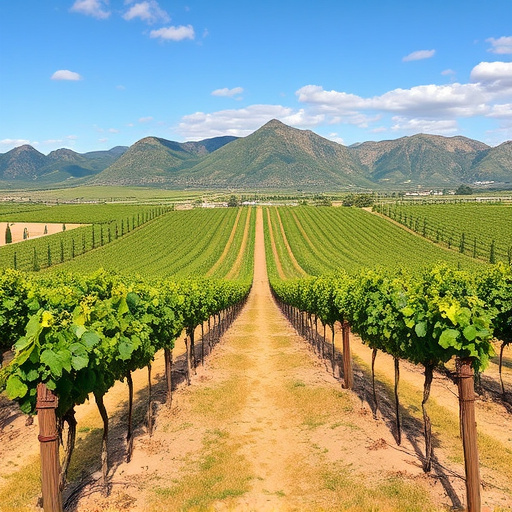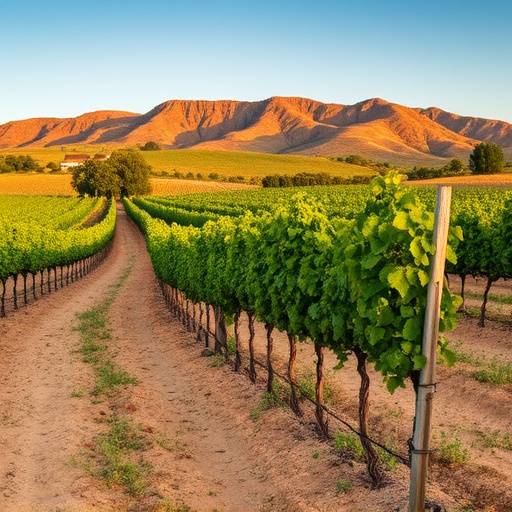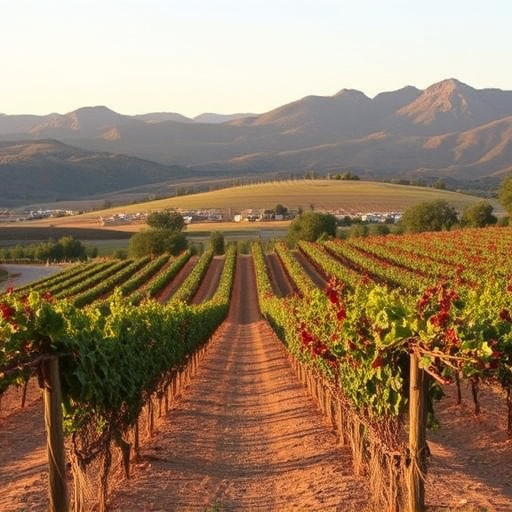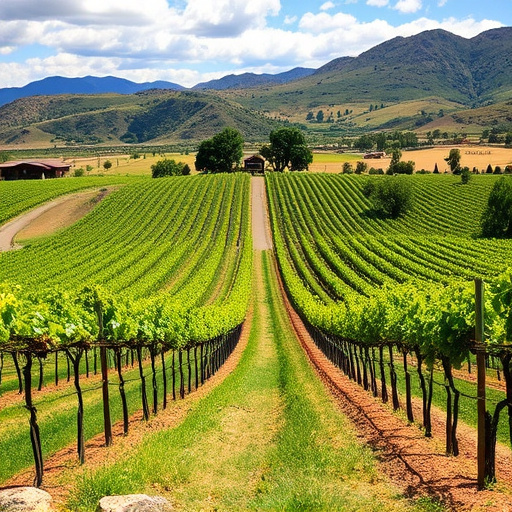The Sonoita region in Arizona has established itself as a leader in eco-friendly wine production, featuring vineyards that embrace sustainable practices like dry farming. This traditional method cultivates grapes without heavy irrigation, preserving land health and producing distinct wines showcasing the region's terroir. Vineyards in Sonoita, AZ are pioneering sustainable agriculture, combining environmental stewardship with exceptional wine quality to attract global eco-conscious wine enthusiasts.
Discover the vibrant, eco-conscious world of vineyards in the Sonoita region of Arizona. This unique wine-growing area has embraced dry farming, a sustainable viticulture practice that minimizes water usage and maximizes soil health. Explore how local wineries are leading the charge in environmental stewardship while producing exceptional wines. From the challenges faced to the remarkable benefits, this article delves into the impact of dry farming in Sonoita, offering insights into both the industry and the environment.
- The Sonoita Region: A Unique Wine-Growing Area
- Dry Farming: A Sustainable Viticulture Practice
- The Rise of Eco-Conscious Vineyards in Sonoita
- Challenges and Benefits for Dry-Farmed Wineries
- Exploring the Wines and Their Impact on the Environment
The Sonoita Region: A Unique Wine-Growing Area
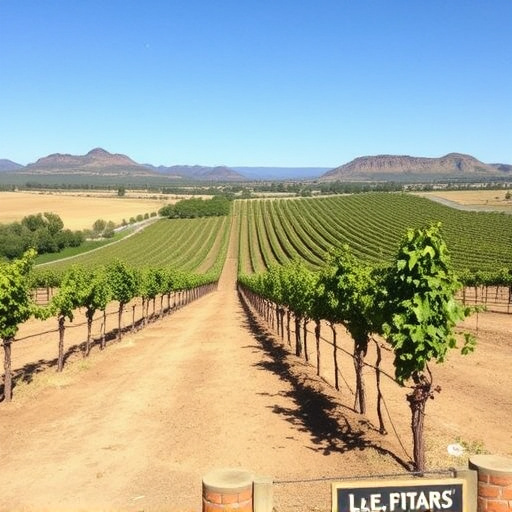
The Sonoita region, nestled in the vibrant and diverse landscape of Arizona, has emerged as a hotspot for eco-conscious wine production. Known for its rugged terrain and distinct climate, this area offers the perfect environment for dry farming practices that are both sustainable and unique. Here, vineyards thrive without relying on extensive irrigation, drawing inspiration from the traditional methods employed by early settlers. The region’s hot summers and mild winters create an ideal setting for grape cultivation, with low moisture levels encouraging deep root systems that can access water during dry periods.
These vineyards in Sonoita, AZ, are not just about producing high-quality wines; they are also stewards of the land. By adopting dry farming techniques, these wineries minimize their water usage and reduce environmental impact. This approach allows them to cultivate grapes with minimal artificial intervention, resulting in distinctive flavors that reflect the terroir of the region. The Sonoita wine scene is a testament to how sustainable practices can enhance both the quality of the grapes and the overall health of the ecosystem.
Dry Farming: A Sustainable Viticulture Practice
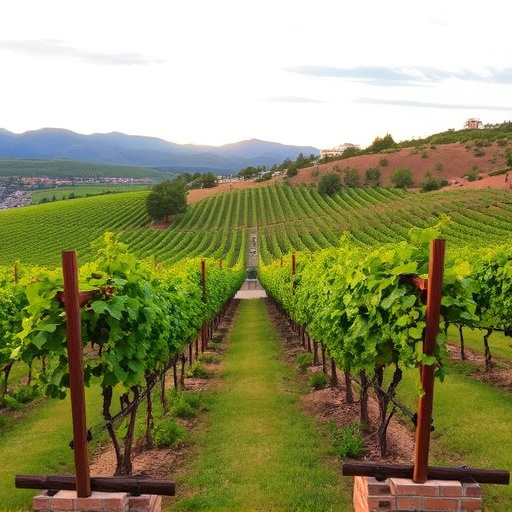
Dry farming is a sustainable viticulture practice that has gained traction in recent years, especially among eco-conscious vineyards in the Sonoita region of Arizona. Unlike traditional irrigation methods, dry farming relies on rainfall and minimal water input to grow grapes, making it an innovative approach to conserve water and reduce environmental impact. In this method, vines are planted in well-drained soil, allowing them to access groundwater during periods of dryness.
This ancient practice is particularly suited to the semi-arid climate of Sonoita, where rainfall is often unpredictable. By minimizing irrigation, vineyards can reduce their water usage, lower energy costs associated with pumping and storing water, and minimize soil erosion. Moreover, dry farming promotes a deeper root system in vines, making them more resilient to droughts and enabling them to access nutrients from further down in the soil profile, resulting in healthier plants and potentially higher-quality grapes.
The Rise of Eco-Conscious Vineyards in Sonoita
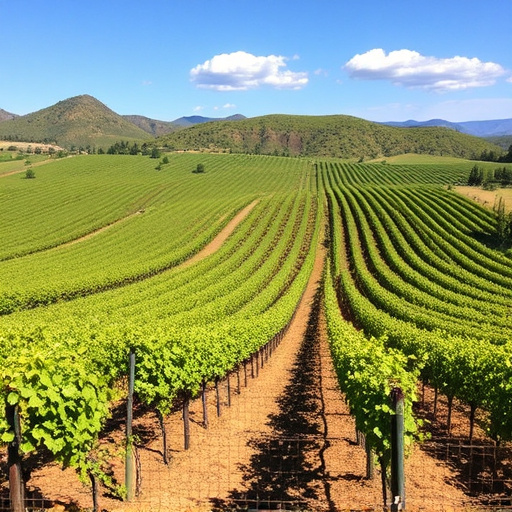
In recent years, there’s been a notable trend among vineyards in Sonoita, AZ—a shift towards eco-conscious practices that reflect a growing global awareness of environmental sustainability. This movement is not just a response to changing consumer preferences but also a recognition of the unique challenges and opportunities presented by the region’s arid climate. Dry farming, in particular, has emerged as a prominent technique, allowing winemakers to minimize irrigation while maximizing water efficiency.
The Sonoita region, known for its vibrant and diverse ecosystem, is home to some of the most innovative vineyards in AZ. These eco-conscious practices extend beyond dry farming, encompassing organic and biodynamic methods that promote soil health, reduce chemical usage, and foster a harmonious relationship between the vineyard and its surrounding environment. As consumers become increasingly conscious of the environmental impact of their food and wine choices, vineyards in Sonoita, AZ are poised to lead the way in sustainable viticulture, offering not just high-quality wines but also a compelling story of ecological stewardship.
Challenges and Benefits for Dry-Farmed Wineries
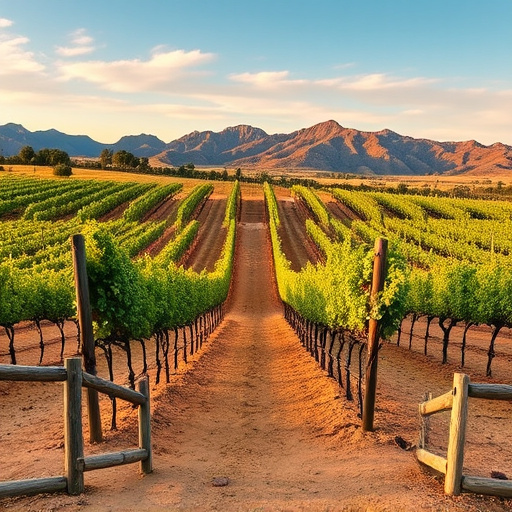
Dry farming, an ancient viticulture practice, is gaining popularity among eco-conscious wineries in the Sonoita region of Arizona. This method, which relies on rainwater and natural drought tolerance rather than irrigation, presents both unique challenges and significant benefits. One of the primary hurdles for dry-farmed vineyards is ensuring consistent water availability during arid summers. Winemakers must carefully select soil types and grape varieties suited to low-water conditions, and employ strategies like mulching to preserve moisture.
Despite these challenges, Sonoita’s dry farming offers remarkable advantages. It fosters a deeper connection with the land, as vines adapt to local conditions. This practice promotes healthier, more resilient plants, resulting in distinctive wine flavors reflecting the region’s terroir. Moreover, it reduces water usage, minimizing the environmental impact and contributing to the sustainable future of Arizona’s vineyards.
Exploring the Wines and Their Impact on the Environment
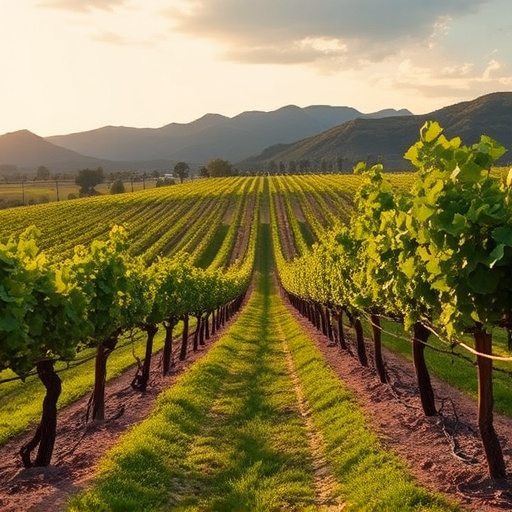
The wines from Sonoita, Arizona, are not just a delight for taste buds but also a testament to eco-conscious viticulture. These vineyards employ dry farming techniques, minimizing irrigation and relying on rainfall, which significantly reduces water usage and conserves this precious resource. This approach not only minimizes the environmental impact but also contributes to the unique character of the wines, often showcasing distinct, intense flavors that reflect the region’s climate and soil.
The impact extends beyond water conservation. Dry farming promotes healthier soils as it discourages soil erosion and fosters a more diverse ecosystem. By forgoing synthetic chemicals, these vineyards support local biodiversity and preserve the natural balance of the landscape. The result is not just a healthier environment but also wines that are truly reflective of their terroir, making them sought-after by environmentally conscious wine enthusiasts from around the world.
The vineyards of Sonoita, Arizona, stand as a shining example of how sustainable viticulture practices like dry farming can thrive in unique, challenging environments. By embracing eco-conscious approaches, these wineries not only produce exceptional wines but also contribute to the preservation of the region’s delicate ecosystem. As consumer demand for environmentally friendly products grows, the success of Sonoita’s eco-focused vineyards highlights the potential for a greener future in the wine industry, inspiring similar initiatives worldwide. Discovering and supporting these innovative wineries means embracing not just delicious, unique wines, but also actively participating in the protection of our planet.
